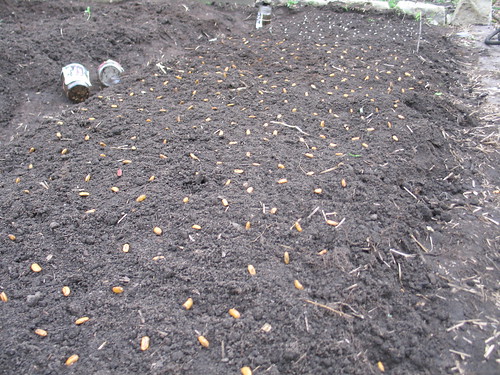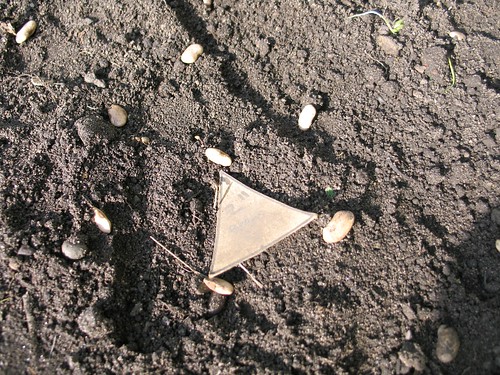Wednesday, June 1, 2011
growing beans
i'm pretty sure that beans are now my favorite thing to grow in my garden. last year a fellow community gardener told me about growing dry beans-something that had never occurred to me before. of course, when i opened the seed savers catalog there were pages of heirloom beans just waiting to be planted in my garden! i started off with hutterite soup beans and october beans. they were so easy to grow and took up relatively little space. for each seed packed of about 50 seeds, i harvested about 2 cups of beans. enough for a couple of meals. we eat a lot of beans (mostly black) so i would never try to grow enough to feed us all year, but to incorporate a little variety into our bean diet, and for more special meals, i'm all about the beans.
i saved some seeds from the two varieties i planted last year, and added some new ones: tiger's eye, turkey craw, calypso, and hidatsa shield figure. and of course, i ordered way more than one seed packet each (um, so far i still have a few seed packets that haven't been planted and my garden is full! i'm going to have to replace all the early spring crops with beans, i think). for dry beans, you leave the fruits on the plants until they are completely dried out. completely. you want them to be crispy. once crisped, they are easy to pick and shell, and you just put the beans in the oven on low for about 15-20 minutes to make sure that there are no itty bitty creatures living inside. store in a jar, and save for a delicious meal. we made a delicious soup with our hutterite beans a few months ago, but i'll admit that i haven't had the nerve to cook up our october beans just yet. i guess i've been waiting for a special occasion, but i know we should just eat them! they'll be delicious in a summer bean salad...
last spring i learned about a method of planting called "hexagonal planting" in which seeds are planted in hexagons instead of rows, which allows you to plant seeds closer together and also helps deter weeds. i tried this with a few of my plants last year, but was most successful with the beans- allowing me to plant each packet of 50 seeds in an area about 2'x2'. All you have to do is make a triangle where each side is the distance that the seedlings are intended to from each other once thinned (so, 2" for beans, 4" for carrots, 8" for lettuce, etc.). then plant your seeds at each point on the triangle and shift the triangle around in a circle to make a hexagon. this technique was originated in a john jeavons book, where it goes into much more mathematical detail, and includes how to use this method for companion planting as well.
another tip about growing beans that i'm trying for the first time this year is to coat the seeds in rhizobium powder prior to planting. someone had told me about it last year, but i'd already planted. by this spring, i had completely forgotten, but luckily i came across a reference to it in the backyard homestead a few weeks ago and i snagged a packet. rhizobium is a naturally occurring bacteria that, when applied to bean or pea seeds up to 24 hours prior to planting helps the seeds absorb more nutrients and can make the plants up to 50% more productive! (at least, that's what the package says, does anyone have experience with this?) i'll be interested to see how it turns out. who knows, i may be swimming in beans come harvest time!
Labels:
beans,
experiments,
julia,
techniques
Subscribe to:
Post Comments (Atom)



Love the idea of a collective gardening blog. May the beans be plentiful!
ReplyDeleteLast year the bean bugs devoured our green beans, although we did get a couple harvests before they were gone. Hope you beans go well for you this year.
ReplyDeletewill try this next year! thanks. :)
ReplyDelete